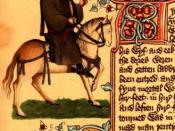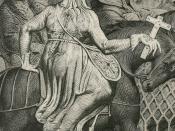"The root of all evil is money." Because this phrase has been repeated so many times throughout history, one can fail to realize the truth in this timeless statement. Whether applied to the corrupt clergy of Geoffrey Chaucer's time, selling indulgences, or the corrupt televangelists of today, auctioning off salvation to those who can afford it, this truth never seems to lose its validity. In Chaucer's famous work The Canterbury Tales, he points out many inherent flaws of human nature, all of which still apply today. Many things have changed since the fourteenth century, but humanity's ability to act foolish is not one of them. Perhaps the best example of this is illustrated in "The Pardoner's Tale." His account of three rioters who set out to conquer Death and instead deliver it upon each other, as well as the prologue which precedes the tale, reveal the truthfulness of the aforementioned statement as it applies to humanity in general and the Pardoner himself.
Before he even begins his tale, the Pardoner delivers a sort of disclaimer, informing the pilgrims of his practices within the church.
The Pardoner was an expert at exploiting parishioners' guilt for his financial gain. He sold them various "relics" that supposedly cured ailments ranging from sick cattle to jealousy. And if the relics didn't seem to work, it was obviously because of the sinful man or woman who purchased them, and no fault of the Pardoner. He had a few lines he would routinely say to his potential customers;
"Good men and women, here's a word of
of warning:
If there is anyone in the church this morning
Guilty of sin, so far beyond expression
Horrible, that he dare not make confession,
Or any woman, whether young or old,
That's cuckolded her husband, be she...



OK
Not bad, but suffered from too little analysis.
0 out of 3 people found this comment useful.